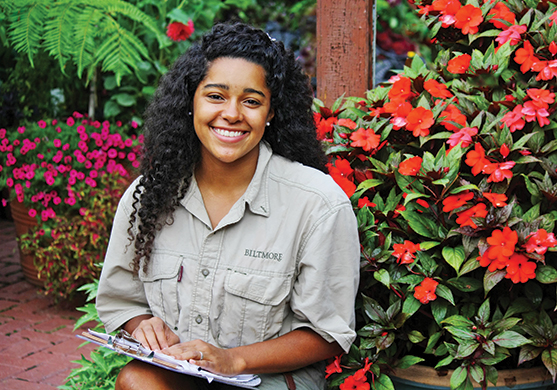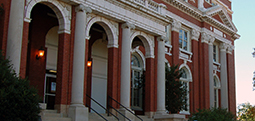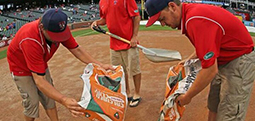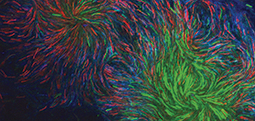| Current Issue | Past Issues | Subscribe | Ag Homepage |

Lighting Up LIFE
by
Nobody had to tell Molly Anne Dutton that she was adopted; that was pretty obvious. Her parents were white, and she wasn’t. Neither were three of her five siblings, none of whom were blood relatives.
But it wasn’t until she was 12, maybe 13, that she heard for the first time the details of her extraordinary story—how a California woman had become pregnant following a rape, how the woman’s angry husband had demanded she either abort or face divorce, and how, instead, the courageous woman had chosen life for the unborn child, relocating to Birmingham, Ala., finding refuge in and support from an agency called Lifeline Children’s Services, and, two days after delivering the baby girl, placing the infant into a loving home through adoption.
“When my mom told me my story, I was overwhelmed with joy,” says Dutton, a senior in Auburn University’s Department of Horticulture. “I never once felt shameful because I realized I was so blessed that my birth mother made that decision, that she’d had Lifeline as a resource, and that I had been given a wonderful, loving family.”
This past fall, Dutton made her personal story of life and joy known across the Auburn campus through “Light Up Life,” the adoption-awareness platform she ran on as one of five finalist in Auburn’s 2013 Miss Homecoming competition.
“I felt like the campaign was an opportunity to share my story and try to create a movement for adoption as an alternative in a crisis pregnancy and to raise money for Lifeline” through T-shirt sales, Dutton says.
Her message struck a resounding chord with the student body, and though she entered the Miss Homecoming competition with a major disadvantage—nominated by Auburn’s student chapter of the Professional Landcare Network, or PLANET, she was the only non-Greek candidate in the running—the vivacious-yet-sincere Dutton won the hearts and the votes of enough Auburn students to win the title of the 2013 Miss Homecoming.
The announcement came in Jordan-Hare Stadium as the five candidates stood at mid-field during halftime of Auburn’s homecoming game against Western Carolina. Dutton was escorted by a woman she describes as “a vessel of love”: her mom, Peggy.
Mrs. Dutton and her husband at the time were volunteers and members of the board of Lifeline 22 years ago when a distraught pregnant woman who had traveled from California showed up at the Birmingham-based Christian adoption agency in search of support, counseling and acceptance. The Duttons were the parents of five children, two biological children who were in their teens and three minority children—then ages 4, 5 and 6 and none of them blood relatives—they had adopted through Lifeline. Molly Anne became Dutton child number six when she was 2 days old.
“I was of mixed ethnicity, and our family was a mixed family,” says Dutton, whose birth mother was white and whose biological father was Jamaican. (“When I was little and they’d give us forms where we had to mark our race, I’d just go through and check any I thought were applicable,” she jokes.)
Dutton was 3 when her parents divorced.
“My mom became a single parent with six kids, and she had to work a lot of jobs when we were young,” Dutton says. “But she was called to be a mother; she is a vessel of love.”
Dutton graduated from Jefferson County’s Gardendale High School in 2010 and arrived at Auburn that fall as a business major, because . . . well, just because.
“I wanted to have a major when I came here, so I chose business because I thought, ‘Well, I may not be passionate about it, but I’ll be able to get a job with it,”” she says.
It didn’t feel quite right, though, so, as she so often does, she relied on her faith.
“I started praying for passion, that I would find what I was passionate about, and I started thinking how my mom loves plants, and I love plants and people, and then somebody said I should talk with somebody in horticulture over in the College of Agriculture,” she says. She did, and one visit with horticulture associate professor Carolyn Robinson was all it took.
“I remember thinking, ‘I have no idea what I’m getting into’—the College of Ag—but I changed my major to horticulture, and that decision has been confirmed in all that’s happened since,” Dutton says. “I love my professors and my classes and everybody in the college.”
She also loved every minute of her summer 2013 horticulture internship, in which the elegant gardens at the Biltmore Estate gardens in Asheville, N.C., were her classroom.
“It was an unbelievable experience,” Dutton says. “I worked in the estate’s Walled Garden, mostly in the rose garden there, but we got to help with other things, like planting and pruning and watering the plants on the grounds. I learned so much, including how to drive a stick shift.”
Dutton is on track to graduate with her horticulture degree in May 2014, and though her goal is to have her own retail nursery and garden center one day, she first plans to go for her master’s in horticulture. At Auburn, of course.
As a child, Dutton knew that she and three of her siblings were adopted, “but I never asked my mom any questions or tried to find out any information, really, because I just wasn’t’ that interested in knowing,” Dutton says. “I never asked to know my story.”
It wasn’t until she was in the attic one day, digging and giggling her way through boxes of old family photos, that she came across her adoption papers, and suddenly, curiosity reigned.
“I ran downstairs and said, ‘Mom, guess what I just found,’ and she immediately sat down and told me everything, and I’d ask questions, and she’d answer,” Dutton recalls. “I guess I didn’t expect her to be so open.
“She did that with me and my adopted siblings,” Dutton says. “Mom didn’t force our stories on any of us; she let us get to the point where we were ready to talk about it.”
Since Oct. 13, Dutton’s story has spread far beyond the confines of Jordan-Hare: She shared it in a live interview on “Fox and Friends” the week after winning the title and has been interviewed by writers from national and international publications; it became an Internet sensation; and it is having the impact Dutton so wanted when she launched “Light Up Life.”
“Molly Anne’s ‘Light Up Life’ campaign has raised awareness and support for adoption,” says Lifeline Children’s Services development director Krisha Yanko. “We’ve seen her story impact peoples’ understanding of adoption and recognize that there is hope in the midst of what can be seemingly a tragic situation.
“Molly Anne has life and has it to the fullest, and that’s a beautiful thing,” Yanko says. ‘Light up life’ is exactly what Molly Anne does, and I pray this story continues to shed light on the gift that life is.”
Unlike many adoptees, Dutton has never had the desire to search for her birth mother. She’s accepted that she’ll likely never know the woman’s name, where she is today, the kind of life she’s had or whether there’s a resemblance. And that’s OK.
“I have always been blessed with an internal perspective that washes me in peace,” Dutton says.
Given the media’s fascination with the Auburn University 2013 Miss Homecoming’s story, Dutton can’t help but wonder whether, somewhere out there, the woman who brought her into the world 22 years ago has made the connection.
“That would be amazing, for her to know how inspired others can be by her selflessness,” Dutton says. “Light Up Life’ wasn’t about being pro-life, or anti-abortion; it was about spreading the positive message that there are adoption services like Lifeline, that there is hope.”








